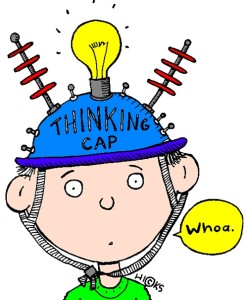 A few years ago I had a student in my classroom with a scrappy personality who was unafraid to speak his mind. One day, towards the end of the year, my fourth graders were working and one student came up and asked me an obvious question. From across the room Mr. Scrappy yells, “She’s not gonna answer that!” He was right. I don’t answer questions in my classroom.
A few years ago I had a student in my classroom with a scrappy personality who was unafraid to speak his mind. One day, towards the end of the year, my fourth graders were working and one student came up and asked me an obvious question. From across the room Mr. Scrappy yells, “She’s not gonna answer that!” He was right. I don’t answer questions in my classroom.
The beginning of the school year is always tiring work. You set up your classroom routines and management. The students are learning your expectations and you are learning their strengths and weaknesses. I always forget how many questions fourth graders ask. When your students start asking questions ask yourself, is this question something I need to answer? I don’t answer questions.
Don’t get me wrong. I love fourth graders and the questions they bring. I love my job as an educator and being able to watch young minds grow and stretch, fail and learn. And honestly, I do answer questions. But questioning is part of the natural learning process and it seems too many classrooms skip that part. Educators help, that is our job. So when a question is asked it is too often answered. It seems we have forgotten the importance of the process of letting students discover answers for themselves.
There is a process to not answering questions. Yes, it takes longer. Reflecting questions back to students and asking them to think of the answer or think of a way to find the answer takes time. It is much faster to spew out the answer and go about your day. But you rob your students of thinking. You take away from them that spark of insight they can find in themselves. You do not allow them to trust themselves which in turn builds their confidence in solving problems. That is why I have stopped answering questions. I let them think!
In many classrooms, teachers ask lower level questions due to time and an effort to keep the lesson moving. Higher-level questions ask students to analyze, evaluate and synthesize information for more learning. By asking higher-level questions, you can actually engage and involve students more and increase learning. I use sticky notes in my lesson plans, teacher manual, or the text I am using with students where I have pre-thought higher-level questions to ask students to apply, evaluate and synthesize information. I allow students the option to draw, use words or write sentences to answer questions. This freedom gets the process of the answer started which is the important part. Many times the path taken and the journey there is more valuable than the answer.
There are many questions that you are asked in a day, so how do you figure out which ones to answer and which ones to reflect back to the student? Asking questions is part of learning, but there are questions students ask that they could answer themselves. Here are three things to think about:
- Does the student already know the answer to the question?
- Have you already provided an answer for the question?
- Can the student find the answer or figure out the answer by themself?
If the answer to any of these questions is “Yes!” then you do not need to answer the question. Turn it back around and repeat the question or rephrase the question. “Is this good?” asks Kay. “What was your objective? Is it your best work?” asks Mrs. Teacher. “What do I do when I am done?” asks Jack. “Have you done your best work? What subject are we working on? What do you need to practice or wok on in this subject?” asks Mr. Teacher. Providing your student with the opportunity to problem solve shows them you are confident in them and teaches them they are problem solvers. When they make decisions on their own they will have confidence in their ability do think.
If you have a student who does not seem to have an answer or struggles to find the answer then guide them. Ask questions that will move their thinking towards the answer. Another strategy that is helpful is to break the question down into manageable parts. Starting with simple questions will allow your student to practice their problem solving and will lead them to more complex thinking and problem solving as they get older. You can also break questions down and restate them in part for older children. ‘Why do I have to show all of my work?” asks Lee. “How do others understand your thinking? What do you need to be able to do to explain your answer to others? How do you know it is your best work?” asks Mrs. Teacher. Guiding students teaches them to ask these questions on their own to problem solve and think.
In the beginning it may take a while for each of you to get used to moving away from the quick fix. It is simpler and easier to answer questions, even when we are asked a million a day. If you have younger children you may want to start with modeling this process. Ask them questions and then provide the answer. When they ask a question, restate the question before you answer it. This will model for them the problem solving process. As they get older follow the same rules as above:
- Does the student already know the answer to the question?
- Have you already provided an answer for the question?
- Can the student find the answer or figure out the answer by themself?
If the answer is yes to any of these then let the student develop their problem solving by answering their own questions.
Does this mean every question should now be reflected back onto the child? While “She’s not gonna answer that!” is often a true statement in my classroom, there are questions I answer directly. Your role is important and it is your responsibility to share information and teach your students as well. So, what does not count? When should you step in? What questions SHOULD be answered? Here are a few things to think about:
- Is this a big life question involving morals or judgment?
- Is this an opinion question?
- Is the student seeking your advice?
- Is the student trying to start a conversation?
If the answer to these questions is yes then your student needs you to listen and help. These instances they want your conversation, opinion or advise. Take this opportunity to engage in conversation and enjoy the moments of teaching. But for the simple things, the where does my work go, and the why do I have to…? Reflect those questions back and take pride in knowing you are helping your students develop problem solving skills that will guide them and give them confidence in their own thought processes throughout life.





Leave a comment